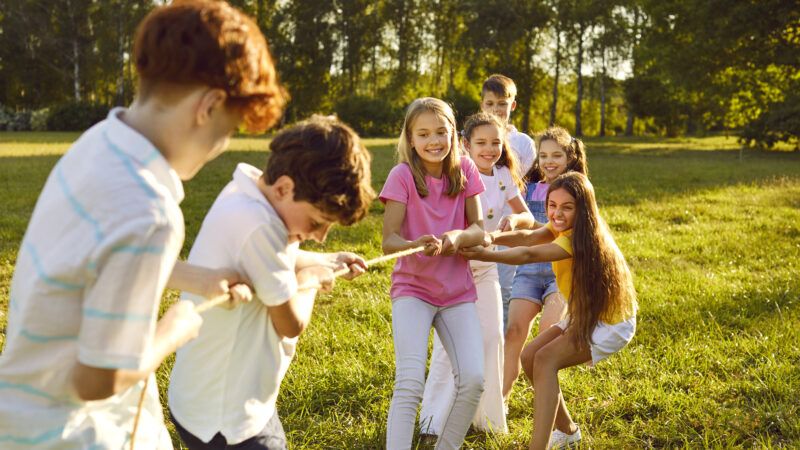Celebrate Thanksgiving by Letting Your Kids Play Outside
"Take a moment to appreciate all that they can learn from trying to complete the task on their own," says Yale University's Julia Leonard.

Are the kids at your Thanksgiving celebration being too loud? Or, more likely, too quiet—bathed in the glow of an iPhone? Here's a solution: Open the door.
Especially if there are cousins around, give one of the kids a watch (explain that it's like a portable sundial). Tell them they can come back inside when the big hand reaches a certain number. Then, close the door behind them: adults stay indoors, kids play outdoors.
I suggest this so you can have a very happy holiday, while the younger relatives have a very educational one, according to Yale University.
For the past generation or two, it has been getting harder and harder for parents to spend any time apart from their kids. They worry that any moment their wonderkids aren't being watched, helped, and plumped full of knowledge, they are in danger of being hurt or (God forbid) falling behind.
Now, Yale is taking one of those worries off the Thanksgiving plate. A study recently published in The Journal of Child Development—released just in time for the holidays—found that when adults are told that kids actually "learn" by doing things on their own, they intervene less. Presumably, this means the adults stop tying shoes, zippering backpacks, and playing endless games that the kids should be playing with other kids (especially if the game involves a chute or a ladder).
"When an adult steps in and completes a task for a young child, it can deprive the child of an opportunity to learn how to complete the task by themselves, which potentially harms their ability to develop self-efficacy, autonomy, and other important life skills," says lead author Reut Shachnai, a psychology graduate student at Yale. "Our findings suggest that framing everyday tasks as 'learning opportunities' can significantly reduce over-parenting, and in turn boost children's independence, persistence, and resilience."
That's what I've been saying for about 15 years—and Maria Montessori was saying about a century ago: doing things for our kids that they're ready to do themselves (or almost ready) deprives them of the opportunity to master a skill. And what makes any of us feel great? Mastering a skill! Whether it's perfectly browning a turkey or simply adding half a stick of margarine to Stove Top stuffing and serving it up unscorched.
The Yale study was quite clever. Researchers began by interviewing 77 parents of kindergarten-age kids. They found that parents are less likely to intervene when they think their kids are learning something (say, doing a puzzle) than when the kids are just doing some mundane activity.
Then, at a children's museum in Philadelphia, the researchers recruited 30 kids to tackle a novel and lightly challenging task: putting on hockey gear.
The researchers told half the parents that putting on the gear was an opportunity to learn a life skill—it was educational. They told the other half that it was a way to engage with the museum.
The parents who had been told this was a learning opportunity intervened about half as many times as the control group.
Yale Assistant Professor of Psychology Julia Leonard, a co-author of the study, said that considering how intensive parenting has become, "we can recommend to parents, teachers and mentors alike: The next time you find yourself tempted to complete a task for a child, take a moment to appreciate all that they can learn from trying to complete the task on their own."
That means sitting on the couch with family and maybe drinking a glass of wine while the kids do the dishes—or organize their own game of tag—isn't being lazy. You're facilitating their education!


Show Comments (33)